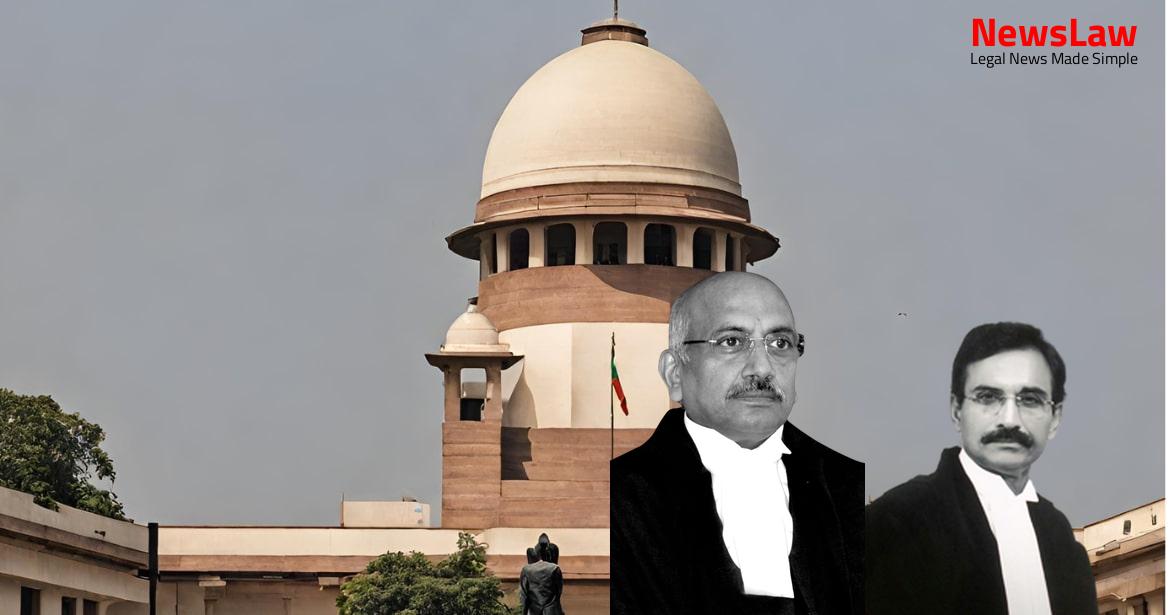In a significant legal battle, the Supreme Court of India has rendered a decisive judgement regarding the dispute over unlawful termination. The case involved allegations of unfair labor practices, transfers, and termination, with implications for employee rights and employer actions. Stay tuned to understand the details and ramifications of this key legal ruling.
Facts
- The employee alleged that Mr. Ashish Khare, a union member, was forced to resign but it was not accepted.
- Two managers drove Mr. Ashish Khare out of a hotel at night during a Conference.
- The employee protested against the treatment of Mr. Ashish Khare and was threatened with transfer and severe actions against colleagues.
- The employee did not report for duty at the transferred place, leading to termination on 15 April, 2005.
- Claimed that the Industrial Court did not have jurisdiction over the termination issue in the complaint.
- The existence of Sagar Unit of Madhya Pradesh Medical Representatives’ Association was questioned by the employer.
- The employee’s transfer was deemed unjust, unfair, and amounted to unfair labor practices.
- Alleged employer’s adverse actions post his complaint including transfers, suspensions, and terminations.
- Issues contested: employee’s workman status, allegation of attending a conference without invitation, the transfer being contractually justified.
Also Read: Interpretation of Mandatory Statutory Time Limits
Issue
- Employee disputing termination order as not received
- Dispute over transfer as unfair labour practice
- Impleading the person acting mala fide in dispute over transfer
- Infer malice in law in transfer of employee as unfair labour practice
- Termination order ancillary to transfer order for Industrial Court jurisdiction
Analysis
- Allegations of mala fide have two facets – malice in law and malice in fact.
- Jurisdiction of the Industrial Court is to decide unfair labor practices except those falling under Item 1 of Schedule IV.
- Employee admitted in cross-examination that there was no Union by the name Madhya Pradesh Medical and Sales Representatives’ Association.
- Challenging termination as a consequence of non-joining on a transferred post does not confer jurisdiction on the Industrial Court.
- Transfer by itself cannot be an act of unfair labor practice unless actuated by mala fide.
- The power of transfer exists with the employer as mentioned in the letter of appointment.
- Allegations of mala fide are easier to levy than to prove.
- If an employee is transferred after 20 years to the company’s headquarters, it cannot be considered without lawful excuse.
- Termination order can be disputed only before the Labour Court, not the Industrial Court.
- Allegation that transfer was unfair labor practice without impleading the person acting mala fide is not sustainable.
- Complaint about termination must be addressed through the relevant forum created by the statute.
- Allegation of malice in law is not substantiated.
- Termination order does not become fake if the employee fails to receive it.
- Employee’s foundation for alleging malice in law is insufficient.
- Evidence filed by the employee supports the version given in the complaint.
- High Court rightfully set aside the finding of the Industrial Court on the termination order.
- Act of transfer can be unfair labor practice if actuated by mala fide.
- The Industrial Court lacks jurisdiction over complaints related to unfair labor practices described in Item 1 of Schedule IV.
- Specific provision states that complaints related to Item 1 of Schedule IV fall within the jurisdiction of the Labour Court.
- To sustain a plea of mala fide, an element of personal bias or oblique motive is required.
- Mala fide refers to the absence of good faith, personal bias, grudge, improper motive, or ulterior purpose.
- Mere use of the term ‘mala fide’ is not sufficient to make a petition admissible.
- When allegations of mala fides are made, the accused individuals must be made parties to the proceedings to allow them to respond to the accusations.
- Declaring an action as mala fide is a serious accusation that can have adverse civil consequences.
- An act deemed mala fide is done wrongfully and willfully without reasonable or probable cause, not necessarily out of ill feeling.
- Allegations of mala fides are easier to make than to prove, demanding a high level of credibility for proof.
- A plea of mala fide involves determining personal bias or an oblique motive, as well as assessing if the administrative action aligns with valid exercise of power.
- Legal malice or malice in law refers to something done without lawful excuse.
- The dispute regarding termination as an act of victimization falls within the jurisdiction of the Labour Court.
- The appellant did not establish a case for interference against the order passed by the High Court in the present appeal.
- The Labour Court alone was deemed competent to decide on the issue of alleged unlawful termination of the appellant.
- Based on the above points, the present appeal was found to be without merit and was dismissed.
Also Read: Challenging Legal Analysis in Acquittal Reversal
Case Title: RAJNEESH KHAJURIA Vs. WOCKHARDT LTD. (2020 INSC 43)
Case Number: C.A. No.-008989-008989 / 2019



